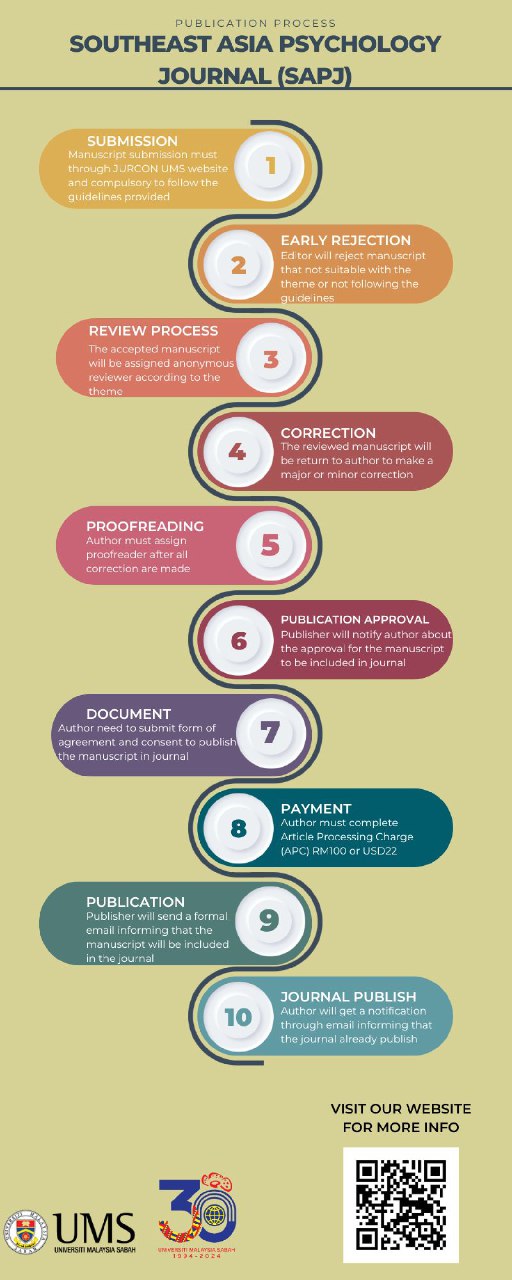Big-Five personality traits and its effect on Emotional intelligence among public school personnel in Malaysia
DOI:
https://doi.org/10.51200/sapj.v3i1.5661Keywords:
Emotional intelligence, Personality traits, school leadersAbstract
The aim of the present study was to examine the effect and contribution of Big Five personality traits towards emotional intelligence among high performance public school personnel carrying their role as school leaders. Sample of the study was comprised of 306 (Male =132; Female =174) public school personnel as leaders in their respective environments, such as principal, senior administrative assistant, senior assistant student affairs (HEM), senior assistant curriculum, the heads of the four departments set by the Ministry of Education i.e. Heads of Humanities and Religion, Science and Math, English, and Engineering & vocational as well as members of general committee from High Performance Schools (SBT) in Malaysia. Emotional Competence Inventory (ECI) and The Revised NEO Personality Inventory were used to measure EI and personality traits accordingly. Regression analysis showed that personality traits was becomes a significant predictors and contributing significantly in order explain emotional intelligence i.e. Conscientiousness (R² = .305, F= 133.528, P<0.05), Extraversion (R² = .357, F= 84.295, P<0.05), Agreeableness (R² = .414, F= 71.151, P<0.05), and Openness to experiences (R² = .428, F= 56.196, P<0.05). The finding revealed that all four personality traits emerged as significant predictors of emotional intelligence. The finding also revealed that Conscientiousness emerged as best predictor of emotional intelligence. However,different traits play differential roles in predicting the emotional intelligence. Keeping in view the implications of personality traits towards EI among school personnel as leaders, finding of the present research can help to improve overall organizational
behaviour and productivity resulting in optimum service delivery to the stakeholders within educational system in Malaysia.
References
Athota, V.S., & O'connor, P.J., & Jackson, C.(2009). The role of emotional intelligence and personality in moral reasoning. From http;//researchonline.nd.edu.au/sci
Barrick, M.R., Mount, M.K. & Judge, T.A. (2001). Personality and job performance at the beginning of the new millennium : What do we know and where do we go next? International Journal of Selection and Assessment, 9, 9-30.
Beer, M,. & Nohria, N.(2000). Cracking the code change. Harvard Business Review, 7893),133.
Beshart, Muhammad Ali (2010). The relationship between emotional intelligence and self-efficacy and academic success, Education Renovation Journal, 2 910), 1-10.
Caruso, D., Mayer, J.D., & Salovey, P.(2002). Emotional intelligence and emotional leadership. In R.Riggo & S. Murphy & F.J. Pirozzolo (Eds.). Multiple intelligence and leadership. Mahwah, NJ :Lawrence Erlbaum.
Costa, P.T & Mc Crae,R.R.(1992). Revised NEO Personality Inventory (NEO-PI-R) and NEO Five Factor Inventory (NEO-FFI) Profesional Manual . Odesse,Fc : Psychological Assessment Resources. Inc.
Day, A.L. & Carroll, S.A.(2004). Using an ability-based measure of emotional intelligence to predict individual performance, and group citizenship behaviours. Personality and Individual Differences. 36,1443-1458.
Goleman, D. (1995). Emotional Intelligence: Why It Can Matter More Than IQ. New York : Bantam Book
Goleman, D. (1998). Working with emotional intelligence. New York : Bantam Book.
Goleman, D. (2000). Leadership that gets results. Harvard Business Review,pp.78-90.
Goleman, D. (2001). An EI-based theory of performance. In C.Cherniss & D. Goleman (Eds.) The emotional intelligence workplace. San Francisco : Jossey- Bass.
Maccoby, M. (2009), To win the respect of followers, leaders need personality intelligence, Ivey Business Journal Online, Jan/Feb
Mayer, J.D., Salovey, P., & Caruso, D.R. (2000). Emotional intelligence as zeitgeist, as personality and as a mental ability. In R.Bar-On and J.Parker (Eds), The Handbook of emotional intelligence: Theory, development, assessment and application at home, school and in the
workplace.(pp.92-117). San Francisco, California: Josey-Bass Inc.
Mayer, J.D., Salovey, P., & Caruso, D.R. (2004). Emotional intelligence: Theory, findings and implications, Psychological Inquiry, 15, 197-215
MacCrae, R.R. (2000). Emotional intelligence from the perspective of the big five-factor model of personality. In R. Bar-On & J.D.A.Parker (Eds), The Handbook of emotional intelligence: Theory, development, assessment and applied.
Piderit, S.K.(2000).Rethinking resistance and recognizing ambivalence: a multidimensional view of attitudes toward an organizational change, Academy of Management Review, 25 (4), pp. 783-794.








